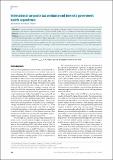Files in this item
International corporate tax avoidance and domestic government health expenditure
Item metadata
| dc.contributor.author | O'Hare, Bernadette Ann-Marie | |
| dc.date.accessioned | 2019-11-04T10:30:03Z | |
| dc.date.available | 2019-11-04T10:30:03Z | |
| dc.date.issued | 2019-11 | |
| dc.identifier | 259234190 | |
| dc.identifier | 332b56fb-6f64-4270-a5dd-cd725722d834 | |
| dc.identifier | 85074420316 | |
| dc.identifier | 000493965200006 | |
| dc.identifier.citation | O'Hare , B A-M 2019 , ' International corporate tax avoidance and domestic government health expenditure ' , Bulletin of the World Health Organization , vol. 97 , no. 11 , pp. 746-753 . https://doi.org/10.2471/BLT.18.220897 | en |
| dc.identifier.issn | 0042-9686 | |
| dc.identifier.other | ORCID: /0000-0003-1730-7941/work/63380968 | |
| dc.identifier.uri | https://hdl.handle.net/10023/18841 | |
| dc.description.abstract | Objective To compare estimated losses from international corporate tax avoidance in individual countries and domestic government health expenditure, with reference to the annual threshold of 86 United States dollars (US$) per capita required to achieve universal health coverage. Methods I obtained and compared estimates of international corporate tax avoidance and domestic government health expenditure for 2013. Findings Data were available for 100 countries: 24 low-, 28 lower-middle-, 21 upper-middle- and 27 high-income countries. Domestic government health expenditure was under US$ 86 per capita in all 24 low-income countries and in 24 of 28 lower-middle-income countries. International corporate tax lost per capita was higher than domestic government health expenditure in 19 low-income and 10 lower-middle-income countries. If the revenue lost to tax avoidance were recouped and allocated to the health sector, average annual government health expenditure could increase from US$ 8 to US$ 24 per capita in the low-income countries studied and from US$ 54 to US$ 91 per capita in the lower-middle-income countries. Conclusion Recouping losses due to international corporate tax avoidance and allocating them to the health sector would help low- and lower-middle-income countries achieve universal health coverage, a target of sustainable development goal (SDG) 3. Tackling tax avoidance requires cooperation between the governments of all countries, multinational corporations and investors, including private individuals. International cooperation to improve domestic resource mobilization is the focus of SDG target 17.1 | |
| dc.format.extent | 8 | |
| dc.format.extent | 2469619 | |
| dc.language.iso | eng | |
| dc.relation.ispartof | Bulletin of the World Health Organization | en |
| dc.subject | RA0421 Public health. Hygiene. Preventive Medicine | en |
| dc.subject | 3rd-NDAS | en |
| dc.subject | BDC | en |
| dc.subject | R2C | en |
| dc.subject | SDG 3 - Good Health and Well-being | en |
| dc.subject.lcc | RA0421 | en |
| dc.title | International corporate tax avoidance and domestic government health expenditure | en |
| dc.type | Journal article | en |
| dc.contributor.institution | University of St Andrews. School of Medicine | en |
| dc.identifier.doi | 10.2471/BLT.18.220897 | |
| dc.description.status | Peer reviewed | en |
| dc.identifier.url | https://www.who.int/bulletin/volumes/97/11/18-220897/en/ | en |
This item appears in the following Collection(s)
Items in the St Andrews Research Repository are protected by copyright, with all rights reserved, unless otherwise indicated.

